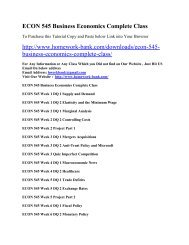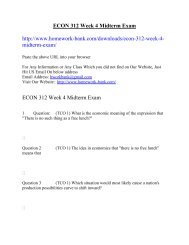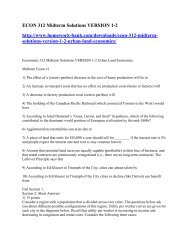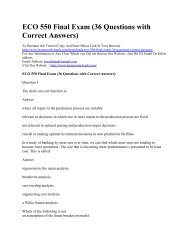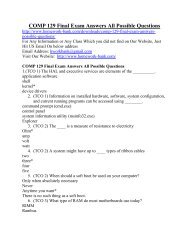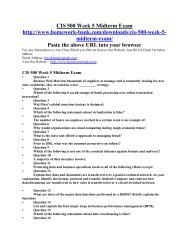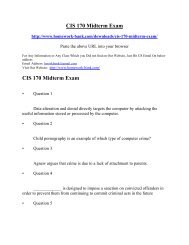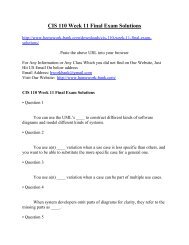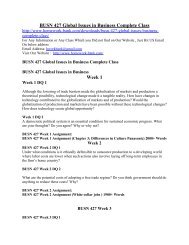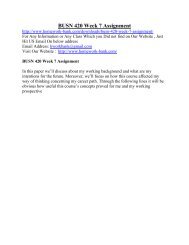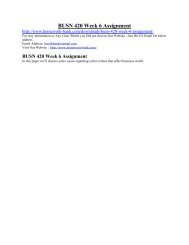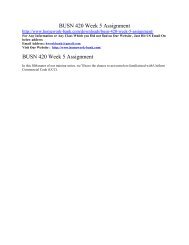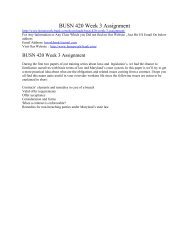BUSN 427 Final Exam Answers
For Any Information or Any Class Which you Did not find on Our Website , Just Hit US Email On below address Email Address: hworkbank@gmail.com Visit Our Website : http://www.homework-bank.com/
For Any Information or Any Class Which you Did not find on Our Website , Just Hit US Email On below address
Email Address: hworkbank@gmail.com
Visit Our Website : http://www.homework-bank.com/
You also want an ePaper? Increase the reach of your titles
YUMPU automatically turns print PDFs into web optimized ePapers that Google loves.
<strong>BUSN</strong> <strong>427</strong> <strong>Final</strong> <strong>Exam</strong> <strong>Answers</strong><br />
http://www.homework-bank.com/downloads/busn-<strong>427</strong>-final-exam-answers/<br />
For Any Information or Any Class Which you did not find on Our Website, Just<br />
Hit US Email On below address<br />
Email Address: hworkbank@gmail.com<br />
Visit Our Website: http://www.homework-bank.com/<br />
<strong>BUSN</strong> <strong>427</strong> <strong>Final</strong> <strong>Exam</strong> <strong>Answers</strong><br />
1. Question : (TCO 1) What organization was protested in Seattle in 1999?<br />
2. Question : (TCO 2) According to Francis Fukuyama, the collapse of<br />
communism in eastern Europe was followed by which of the following?<br />
3. Question : (TCO 3) Which language is most widely spoken throughout the<br />
world?<br />
4. Question : (TCO 3) Which theory deals with competitive advantage for<br />
countries?<br />
5. Question : (TCO 4) In the last 30 years, the world economy has seen<br />
6. Question : (TCO 5) Chile is included in which of the following regional<br />
integrations organizations?<br />
7. Question : (TCO 6) When a firm engages in hedging it is<br />
1. Question : (TCO 8) What are the three staffing policies available to a<br />
multinational corporation?<br />
2. Question : (TCO 8) In distribution strategy, what are the four main differences<br />
between countries?<br />
3. Question : (TCO 3) India’s caste system has been around for many years.<br />
Explain why its influence has diminished among educated urban middle class<br />
Indians.<br />
4. Question : (TCO 3) In 2006, two Chinese journalists reported that the working<br />
conditions at Hongfujin Precision Industries where Apple’s iPods are produced<br />
were substandard. According to the report, not only were workers at the plant<br />
poorly paid, but they were also forced to work overtime. Apple immediately<br />
responded to the allegations and audited the factory in question. However,<br />
managers at the factory filed a defamation lawsuit against the two journalists.<br />
Despite the fact that Apple’s audit did indeed show substandard working<br />
conditions at the factory, Hongfujin did not withdraw the lawsuit. Eventually the<br />
Reporters Without Borders group took up the case for the two reporters and the<br />
lawsuit was dropped. The allegations against Hongfujin Precision Industries were<br />
made by two Chinese reporters. Discuss the implications of this for other Chinese<br />
companies.
5. Question : (TCO 3) Exports are largely responsible for China’s recent rapid<br />
economic growth. The country, capitalizing on its cheap labor force, has focused<br />
on converting raw materials into products that are exported to developed countries<br />
such as the United States. In 2008, China’s trade surplus was a record $280 billion,<br />
and its holdings of foreign exchange reserves were over $1.95 trillion. Some critics<br />
have suggested that China is following a neomercantilist policy. Are the claims<br />
that China is following a neomercantilist policy valid? Why or why not?<br />
6. Question : (TCO 4) Telefonica is a Spanish telecommunications firm. For<br />
decades, Telefonica had operated as a typical state-owned enterprise, but<br />
privatization and deregulation changed that path in the 1990s. Telefonica began to<br />
aggressively pursue expansion opportunities in Latin America where it quickly<br />
became the number one or two player in nearly every country. Later, Telefonica<br />
turned its sights on Europe where its acquisitions helped transform the company<br />
into the second biggest mobile phone operator in the world. What changes in<br />
political and economic environment allowed Telefoncia to start expanding<br />
globally? Why did Telefonica initially focus on Latin America? Why was it slower<br />
to expand in Europe even though Spain is a member of the European Union?<br />
7. Question : (TCO 7) Why did the world shift from a gold standard to fixed<br />
exchange rates?<br />
1. Question : (TCO 5) Concerning European Union’s progress toward creating a<br />
single financial market, the quest started in 1999 was to have been completed by<br />
2005, however, progress has been slowed by various factors related to the tradition<br />
of each member country operating autonomously. By 2007, significant progress<br />
had been made. Some 41 measures designed to create a single market were in place<br />
and others were in the pipeline. The current issue facing the EU revolves around<br />
the enforcement of the rules that have been established as law. Some experts<br />
believe that it will be at least another decade before the benefits of the new rules<br />
become apparent. Discussion of this feature can begin with the following<br />
questions. What are the benefits of creating a single financial market in the<br />
European Union for companies? Does it make sense for consumers?<br />
2. Question : (TCO 6) In the 1980s, Caterpillar was negatively affected by a strong<br />
dollar and lost significant market share to Japanese competitor Komatsu. The<br />
situation prompted Caterpillar to revise its global strategy and by the 2000s, the<br />
company was in a much better position to deal with volatile currency values. More<br />
recently, a strong dollar has actually helped boost Caterpillar’s bottom line. In the<br />
1980s, a stronger dollar hurt Caterpillar’s competitive position, but in 2008 a<br />
stronger dollar did not seem to have the same effect. What had changed?<br />
3. Question : (TCO 7) In May 2001, the IMF agreed to lend $8 billion to Turkey to<br />
help stabilize its economy and halt a sharp slide in the value of its currency.<br />
Although initially the Turkish government resisted IMF mandates on economic
policy, in 2003 the government passed an austerity budget. By 2005, significant<br />
progress had been made and today, the country appears to be on track for recovery,<br />
with lower inflation rates, an increase in privatization, and a budget surplus. What<br />
led to Turkey’s financial crisis? What goals did the IMF establish as part of the<br />
loan agreement?<br />
4. Question : (TCO 8) MD International is an export intermediary for U.S. medical<br />
equipment manufacturers. The company has been able to capitalize on falling trade<br />
barriers, as well as expand healthcare programs in the Latin American region. MD<br />
International currently represents more than 30 companies and sells to some 600<br />
regional distributors. How does an intermediary such as MD International create<br />
value for the manufacturers who use it to sell medical equipment in foreign<br />
markets? Why do they want to use MD International rather than export directly<br />
themselves?<br />
5. Question : (TCO 8) Boeing made the decision to outsource much of the<br />
production of the 787 in the hopes of significantly reducing the time to get the<br />
product to market. Boeing also anticipated that its outsourcing strategy would<br />
allow it to generate additional sales from the countries that were partners in the<br />
process and reduce its costs and risks. Although Boeing’s strategy worked for<br />
some components, for other parts the strategy was a disaster. Suppliers were late<br />
and some produced poor-quality parts, forcing Boeing to commit additional<br />
resources to the project. What are the benefits to Boeing of outsourcing so much<br />
work on the 787 to foreign suppliers? What are the potential risks? Do the benefits<br />
outweigh the risks?<br />
6. Question : (TCO 8) By 2015, Ford hopes to compete in North America, Europe,<br />
and Asia by offering several global models including the Fiesta, the Fusion, and<br />
the Mondeo. The company, which refers to its new strategy as One Ford,<br />
anticipates that its global models will share the same components and looks and be<br />
positioned in a similar way in each market in which they are sold. What is behind<br />
Ford’s One Ford vision? What is the company hoping to accomplish with this<br />
strategy?



